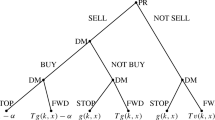Abstract
The paper deals with the following zero-sum game version of the full-information best choice problem. Two person observe sequentially a known number of iid random variables from a known continuous distribution with the object of choosing the largest. The random variables cannot be perfectly observed. Each time a random variable is sampled the sampler is informed only whether it is greater than or less than some level specified by him. Players can choose at most one observation. After each sampling players take a decision for acceptance or rejection of the observation. If both want to accept the same observation the priority is given to the specified player, say Player 1. The class of adequate strategies and the suitable gain function for the problem is constructed. It is shown that the game has solution in pure strategies. The numerical examples are given. The random number of observations is also investigated.
Access this chapter
Tax calculation will be finalised at checkout
Purchases are for personal use only
Preview
Unable to display preview. Download preview PDF.
Similar content being viewed by others
References
E. Enns and E. Ferenstein (1987) On a multi-person time-sequential game with priorities, Sequential Analysis, 6, pp. 239–256.
Z. Poaosirński (1991) Full-information best choice problems with imperfect observation and a random number of observations, Zastos. Matem., 21, pp. 179–192.
M. Sakaguchi (1984) Best choice problems with full information and imperfect observation, Math. Japonica, 29, pp. 241–250.
K. Szajowskl (1993) Double stop by two decision makers Adv. Appl. Probab., pp. 438 – 452.
Author information
Authors and Affiliations
Editor information
Editors and Affiliations
Rights and permissions
Copyright information
© 1994 Physica-Verlag Heidelberg
About this paper
Cite this paper
Neumann, P., Porosiński, Z., Szajowski, K. (1994). A note on two person full-information best choice problems with imperfect observation. In: Bachem, A., Derigs, U., Jünger, M., Schrader, R. (eds) Operations Research ’93. Physica, Heidelberg. https://doi.org/10.1007/978-3-642-46955-8_87
Download citation
DOI: https://doi.org/10.1007/978-3-642-46955-8_87
Publisher Name: Physica, Heidelberg
Print ISBN: 978-3-7908-0794-3
Online ISBN: 978-3-642-46955-8
eBook Packages: Springer Book Archive



